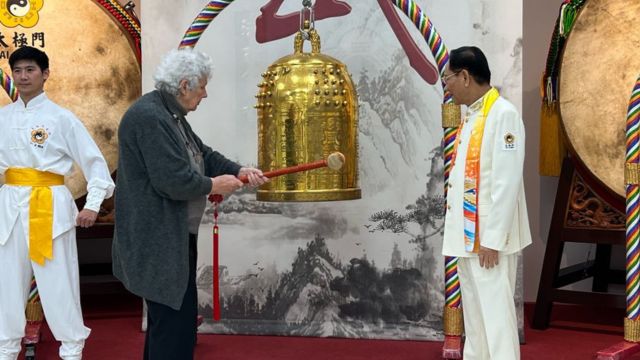On January 7, Eileen Barker, the scholar who created the academic field of new religious movement, rang the Bell in a historical ceremony in Taipei.
by Massimo Introvigne
An article already published in Bitter Winter on January 16th, 2024.

All the scholars who have studied Tai Ji Men are familiar with the Bell of World Peace and Love. The Shifu (Grand Master) of Tai Ji Men, Dr. Hong Tao-Tze, teaches that the bell carries a special meaning in both Western and Eastern traditions. He stated that, “The sounds of the bell in western churches and in eastern temples reminds people to listen to their inner voice. The sound of the bell represents people’s true hearts, social harmony, a nation’s success, and world peace.”
More than 500 world leaders, including presidents, prime ministers, UN ambassadors, religious authorities, Nobel Prize laureates, and NGO leaders have rung the Bell of World Peace and Love both in Taiwan and during Dr. Hong’s tours that have taken him to 103 countries in the world. Each of these leaders had his or her own wish for peace. Some of them acknowledged that ringing the Bell made a change in their life and decisively helped them in their work for peace. I myself was honored and humbled when I was asked to ring the Bell, and will remind the ceremony for the rest of my life as an important moment of solemn commitment to justice and peace.
On the other hand, for all scholars of religion and advocates of religious liberty throughout the world, what happened on January 7 in the main Tai Ji Men Qigong Academy in Taipei carried a unique and historical significance. Eileen Barker, Professor emerita of Sociology at the London School of Economics, who founded the academic field of the scientific study of new religious movements and was honored by Queen Elizabeth with the Order of the British Empire (O.B.E.) for her outstanding contribution to social sciences in Great Britain, visited the Academy, learned about the Bell and Tai Ji Men’s achievements, witnessed beautiful performances of martial arts, songs, and dance, and rang the Bell of World Peace and Love in the presence of Dr. Hong. I was also fortunate to be among those in attendance.

Eileen Barker’s extraordinary work in religious studies and the defense of religious liberty has left an indelible mark on academia and society. Her significant role in fostering understanding, promoting religious freedom, and advocating for global tolerance cannot be overstated. Eileen Barker’s impact on religious studies is evident in her pioneering research on new religious movements. Through meticulous ethnographic research and the development of innovative methodologies, she has shed light on previously misunderstood or stigmatized religious groups. Her work has challenged stereotypes, aiding in the recognition of diverse faith traditions and fostering greater understanding and empathy among scholars and the general public alike.
Barker’s unwavering commitment to defending religious liberty has had a profound influence. Recognizing the importance of religious freedom in contemporary society, she has actively advocated for individuals’ right to practice their faith, either traditional or non-traditional, without discrimination or persecution. Barker’s efforts have shaped discussions on religion and human rights, highlighting the crucial role tolerance and respect play in maintaining a harmonious society. Her work has helped debunk misconceptions surrounding new religious and spiritual movements, contributing to a more inclusive and pluralistic understanding of faith communities.
Tai Ji Men, an ancient menpai (similar to a school) of qigong, martial arts, and self-cultivation, and FOWPAL, the Federation of World Peace and Love also led by Dr. Hong, embody in their own way the same principles of peace, conscience, human rights, and freedom to which Eileen Barker has devoted her life.

The Bell of World Peace and Love holds deep historical and symbolic significance. Rung by international celebrities, it serves as a powerful instrument that amplifies their support for global peace. Barker’s inclusion as one of these distinguished participants both underscored her stature as an immensely influential figure in religious studies and the promotion of religious liberty and cemented the now well-established cooperation between Tai Ji Men, FOWPAL, and leading voices in the academia.
The bell-ringing ceremony on January 6, 2024, in Taipei, thus marked a milestone moment and emphasized that promoting interfaith understanding and dialogue, justice, and freedom of religious or belief is crucial for creating a more harmonious and tolerant world.
I am convinced that the impact of Barker’s ringing the Bell will extend far beyond the event itself. It will encourage other scholars to deepen their knowledge of Tai Ji Men, FOWPAL, and the deep meaning of the Bell, and advance the cause of freedom of religion or belief everywhere, including in Taiwan.

Eileen Barker’s influential career as a sociologist and her contributions to religious studies and the defense of religious liberty are unique. Her participation in the bell-ringing ceremony confirms once again her commitment to fostering freedom of religion or belief, peace, understanding, and interfaith collaboration on a global scale. Her work serves as an inspiration for scholars, advocates, and civil society individuals and groups seeking to create a more inclusive, free, and peaceful world. I am sure it will also inspire Tai Ji Men dizi and Taiwanese authorities and civil society to deepen their understanding of, and commitment to, integrity, conscience, freedom of religion or belief, and human rights.
